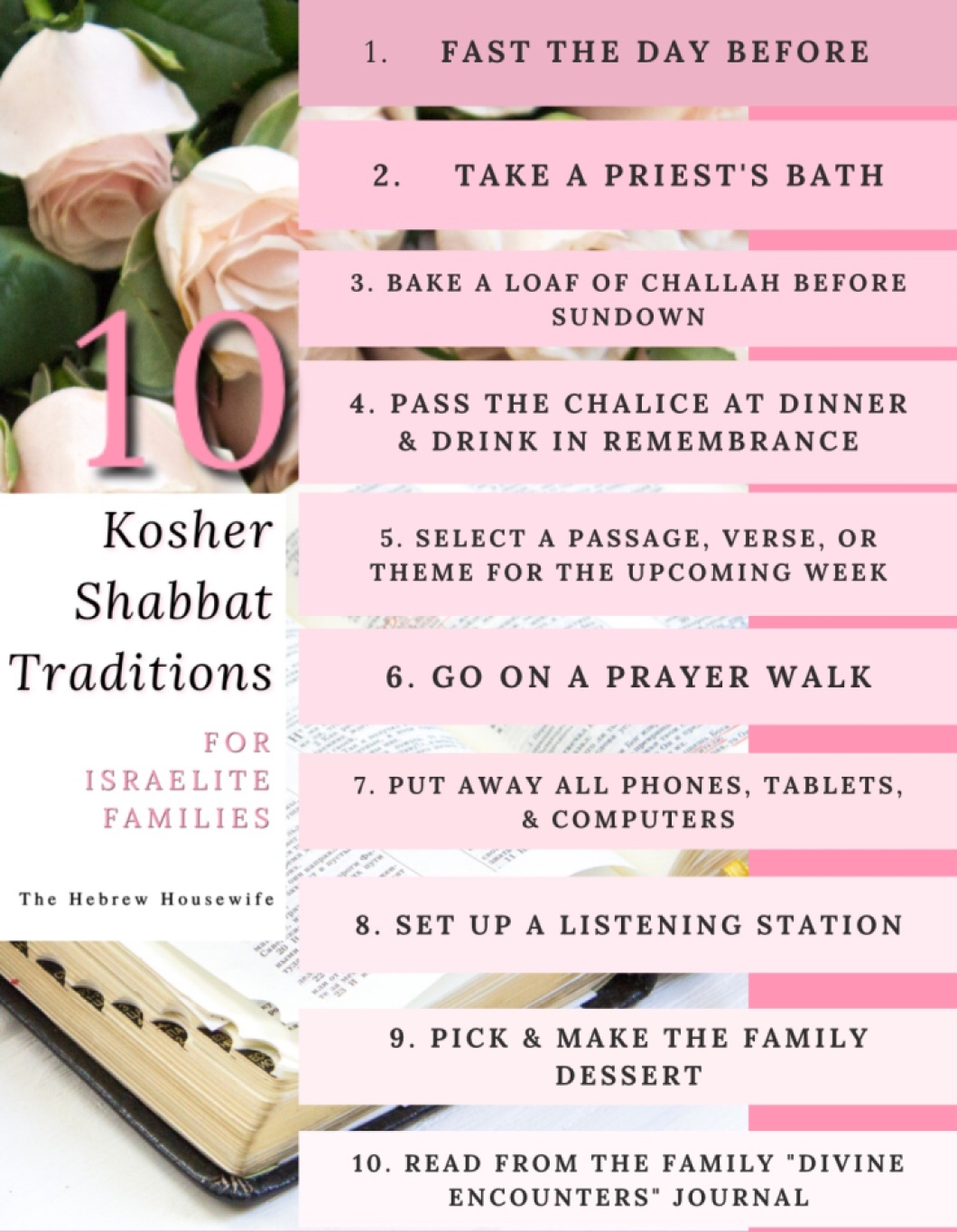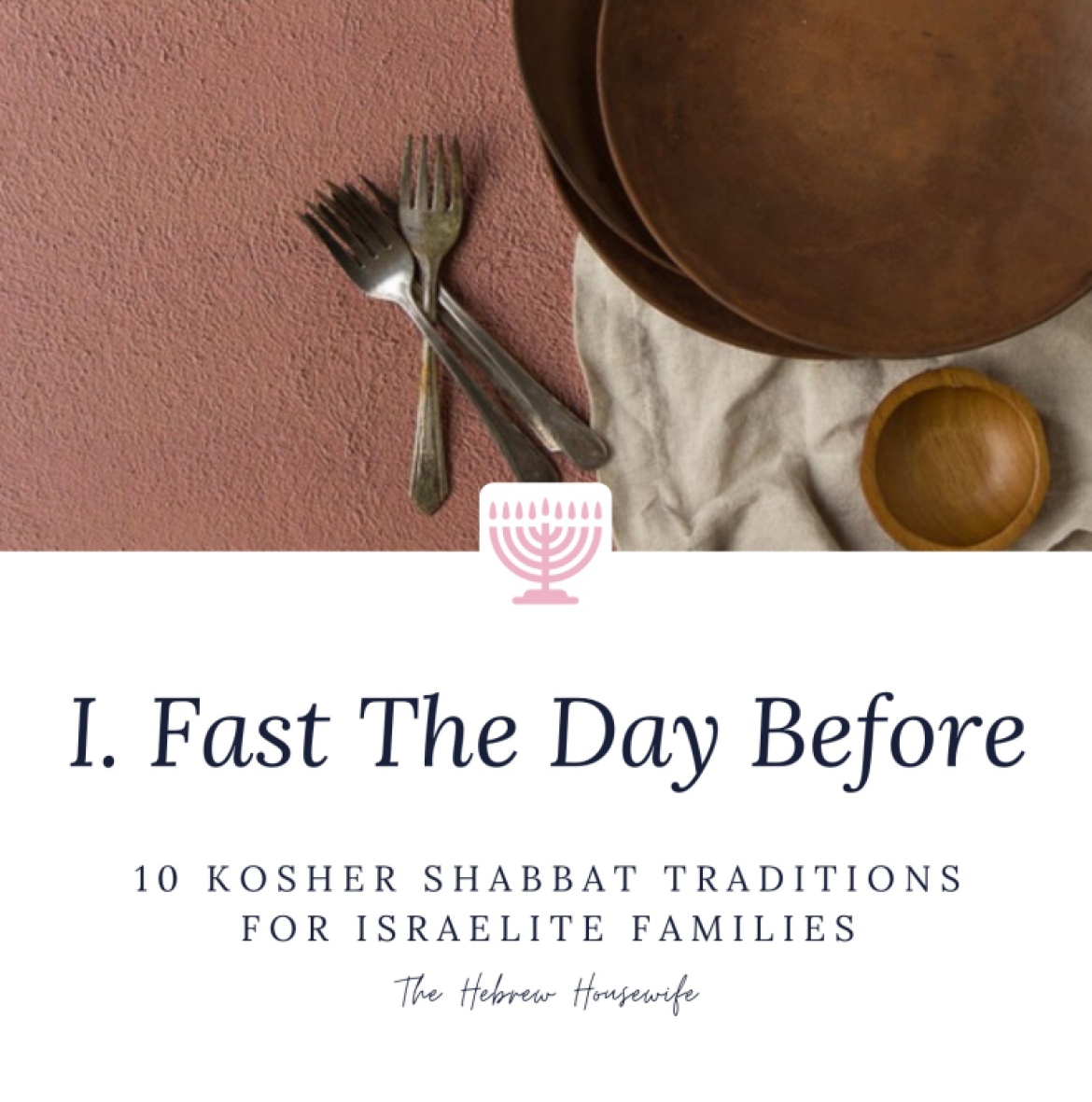Whether you keep Sabbath/Shabbat (day of rest after six days of work; see Genesis 2:1-3 and Exodus 20:8-11) on Saturday (like us), on Sunday like most, or by the moon cycle which can vary month to month, it is no less a staple in Israelite heritage.
We usually spend the day cat napping, eating good, lounging, and of course, praying and studying The Word.
But aside from these basic essentials, I was thinking there are millions of ways to enhance the weekly celebration of rest and salvation. Shabbat shouldn’t be a chore, but something we look forward to after the end of a long week. Who wouldn’t want to make each day of rest more memorable, personal, engaging, practical, exciting, and maybe even habitual?
So I compiled this list of ten simple Shabbat traditions that you practicing Israelites can start this week for free!


So, maybe you wouldn’t consider this free since there are sacrifices involved, but your money won’t be one of them!
Fasting is one of the 5 spiritual disciplines that can save your life (and your wallet), and is one of the most unique ways to dedicate your temple to The Most High. Historically, fasting has been used in a number of ways: to show repentance, to prepare for war, to give oneself a spiritual bath, or to mourn and lament towards Him for a specific cause (like a childbirth, a lost loved one, fear of impending doom, etc.).
What better way to welcome your day of rest than by getting in the zone, cutting out things your flesh enjoys, and giving your mind and focus over to The Most High?

I know, making sure you’re clean is an obvious one. It’s probably become muscle memory at this point for you to clear your checklist, do laundry, pay bills, tidy the kitchen, and get all washed up before the sun goes down.
But have you ever thought about your own personal weekly baptism (or what is known in the Old Testament as a rachats). Simply put, is was a spiritual bath given by a Priest to offenders of the Law, or sinners, to cleanse them of the offense/sin.
It was also the ritual cleansing the High Priest underwent in preparation to enter the Inner Court of the Temple to offer the Sacrifice of Atonement for the entire nation of Israel. This was what The Messiah’s baptism was all about: preparation for our atonement.
As chosen children, heiresses of the promise, bearers of The Ark, and the resurrected body of YHWH, a part of our inheritance is the gift of priestly robes.
“But ye are a chosen generation, a royal priesthood, an holy nation, a peculiar people; that ye should shew forth the praises of him who hath called you out of darkness into his marvellous light”
– 1 Peter 2:9
Even though the blood of The Lamb is the only thing that has made us eternally clean, you can practice ritualistic cleansing with a bath in remembrance of it already being finished!
This will be another great practice to add to your Pre-Shabbat Warm Up to really get into the Spirit and remember why we rest.

(NOTE: Unleavened, or flat bread, is also a great and often more preferred alternative to risen bread that can sometimes feel heavy and take hours to prepare. I encourage you to try both and find whatever works for your house, energy, and serving demands)
Challah is a Hebrew word that is argued to be derived from Halal, which means to boast, praise, shine light on, commend, or celebrate (the root of Hallel-u-Jah). The term originally refers to the portion of dough set-aside as a tithe for the Priest according to Torah. It is a type of ceremonial leavened bread that is braided, simple to make, and extremely delicious!
It has been a part of Israelite tradition since the time of Moses, and even though we don’t typically offer Levitical sacrifices anymore, it can still be a special way to further enrich your Sabbaths each week. Plus, the breaking of bread is the perfect complement to the next tradition on the list…

Every Passover is not only a remembrance of our Exodus from Egyptian slavery, but is also the day The Messiah had ‘The Last Supper’.
As HaMashayach (The Messiah) celebrated Passover with his disciples, he ordered them to eat bread in remembrance of his flesh, and drink the wine in remembrance of his blood.
My foster father (who is no less a father to me because of it) would keep a ritual Shabbat each Saturday at sundown, and a part of our ( very large) family Shabbat induction was the passing around of the wine filled chalice after prayer and passage reading, just before we began dinner in the dark with only candles lighting our evening. It’s a very special memory I hold dear even after all these years (partly because I didn’t want to drink after other people LOL), mostly because I was used to the same old communal crackers and grape juice at a Baptist church every third Sunday, and this was a nice, more intimate change.
Your chalice doesn’t have to be ceramic, gold, silver, anything fancy, or really even a chalice at all. You can start with a regular drinking or wine glass, or cup. What matters is your bonding and fellowship as you rest.
Sharing this ceremonial practice with your family each week can serve as an anchoring if you will– a way to reground and re-root yourself and your family in your purpose, your Master, and your salvation (although I STRONGLY advise against sharing your family chalice with guests).

An almost mindless tradition for Shabbat is to have a weekly devotion, theme, parable, or passage/verse that will serve as a great discussion point at the table.
Typically, you would select a theme, for instance patience, and on Shabbat, have a discussion about patience, read scriptures concerning it, and talk about what true Biblical patience looks like. At the next Shabbat, everyone recap their week of patience, something they learned through practicing it, what YHWH may have said to them, or why the theme of patience came right on time for that week. And on the same evening, transition to a new passage, theme, or verse for the week. Annnnnd repeat

Prayer is obviously a staple in your Shabbat. But movement may also generate some fresh ideas and outlooks while you’re praying. You may be praying, asking for a sign, and a bird could land right in front of you. It’s a specific type of bird, and when you research the spiritual meaning of the bird or the color of it’s feathers, it may correlate to what you just prayed for, or maybe even what you should pray for.
This is a small and seemingly insignificant encounter, but He never misses a single detail. You could widen your chances of having a divine encounter just by stepping outside of the home for a minute or two, and you don’t even have to leave your yard. You could just circle the perimeter of your house, giving thanks, recapping the week, meditating on the scripture, and reflecting on His goodness.
Also, since it’s easy to stick on the couch during Shabbat, a prayer walk is a great way to get the blood flowing, get fresh air, and incorporate the Bible into your motor functions (like the YMCA dance and hand movements). Who knows, you may even begin to find yourself praying each time your feet are on the ground!

If there is ever an appropriate time to not have a radioactive portable sunray beamer in your face that fries your eyes and holds all the apps that prohibit productivity– it’s SHABBAT.
Living in the age of information may make it hard to look away for even five seconds. We must be missing something. But…that’s…kinda…the point?
To be set apart means to do, be, and look different. Of course you’re missing out on the world! But to more than reimburse you, you’re getting extra portions of YHWH!
To make it easier to put your devices away for at least 4-6 hours of the day, get all the resources you’ll need for a successful Shabbat in advance (after all, the sixth day was a day of preparation in Exodus). Have a hard copy of The Bible on hand so you won’t have an excuse to linger on the screen. Put your notifications on silent or Do Not Disturb. And designate dinner as an absolute zero electronics time unless it is being used to serenade the night in some fitting mood music.

Or designate an extra comfortable place where you’ll listen to a sermon, do devotion, listen for His voice, or read Scripture in splendor. It should be absolute shalom (peace)!
A practical option could mean throwing a mountain of pillows and blankets in a corner, drape some sheets overhead, and turn the lights low. Gather the family along with your Bibles and family dessert, and snuggle in for a cozy, engulfing devotional experience that you and your family will remember for the rest of your lives.

Have you ever tasted or smelled something that reminded you of your first day of first grade, or the feeling of being on the couch at your granny’s house? Adding a family recipe can give your Shabbat a comfortable, familiar, distinct taste. Brownies, cookies, unleavened cake– the list can go on. These can even change from season to season, month to month, or week to week.
Floats in the fall, tarts in the spring, fruit salad in the summer, or pound cake in the winter are some cool starter ideas. And if you’re aiming to cultivate healthier habits at your family’s table, you can reduce this Family Dessert Shabbat tradition to once a month + reduce the sugar and carbs!
You could even consider smoothies, shakes, hot cocoa, or making something easy the children can help prepare like homemade chips, trailmix, pizza, or sub sandwiches.

This part can be as simple or decorative and engaging as you want it! Think of it as a record book where you (or you and your family) write down your divine encounters, or lessons learned, throughout the week.
These could be blessings you remember receiving after praying for weeks, a profound insight you gained, or something as simple as “When you do the dishes early, you won’t have to sacrifice your evening relaxation”. It’ll be fun to revisit all the entries at the end of the week, and even make a summary of the week each Shabbat!
This can even be applied to a dry erase or bulletin board that can be decorated with pictures and scriptures, and placed near your listening station for an easy way to keep track of Divine Encounters that occur there, too!
All in all, the easy complements that could easily be turned into Sabbatical traditions are endless. Consider these few ways to add layers to your weekly rest for a lasting impression and increased bonding. And when you do, let me know how it went and if you added your own flare.
Feel free to share any and all of these on your social media, to give other Israelite families ideas for Sabbatical traditions! Until next time, Hebrews, baruk ahtha (bless you)! And Shabbat Shalom!






[…] Look, sometimes there is disorder. Your husband gave you a task you didn’t complete. Your toddler in their terrible-twos has begun to love scissors and other (dangerous) shiny things. You guys missed your weekly Shabbat tradition (and if you need Shabbat traditions, I got you covered here). […]
[…] completely natural. But don’t let your family sleep on the sweet nature of most fruits. In my Kosher Shabbat Traditions post, I tell you about how making your own snacks and desserts can become a sacred family practice […]